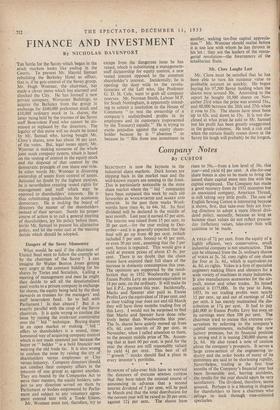Company Notes
By CUSTOS SELECTIVITY is now the keynote in the industrial share markets. Dark horses are slipping back in the market race and the well-known stayers are coming to the front. This is particularly noticeable in the store share market where the " bid " companies have been outpaced this week by such old favourites as wootwonms and MARKS AND SPENCER. In the past three weeks Wool- worths have risen 4s. to Ms. 9d. Its final dividend will be declared in the middle of next month. Last year it earned 67 per cent. The interim was raised from 15 per cent. to 20 per cent.—for the year ending in Dec- ember—and it is generally expected that the final will go up from 40 per cent. (which included 5 per cent. bonus) to 45 per cent. or even 50 per cent., assuming that the 5 per cent. bonus is repeated. This would give a yield at present prices of about £5 8s. per cent. There is no doubt that the chain stores have enjoyed their full share of the increase in domestic consumption this year. The optimists' are supported by the recol- lection that in 1952 Woolworths paid in Excess Profits Levy an amount equivalent to 18 per cent. on the ordinary. It will make its last E.P.L. payment this year. Incidentally, Marks and Spencer also paid in Excess Profits Levy the equivalent of 18 per cent. and as their trading year does not end till March they will have three months trading free of this Levy. I would not be surprised to find that Marks and Spencer have done rela- tively better than Woolworths this year. The 5s. shares have quietly moved up from 67s. 6d. cum interim of 20 per Cent. in November, when I called attention to them, to the present middle price of 70s. Assum- ing that at least 60 per cent. is paid for the year the shares are still reasonably valued to yield 41 per cent. This best of all " growth " stocks should find a place in every investor's portfolio. * * * RUMOURS of take-over bids have so worried the directors of ENGLISH SEWING COTTON that they have taken the unusual course of announcing in advance that a second interim dividend of 5 per cent. will be paid in March and that the total distribution for the current year will be raised to 20 per cent. against 121 per cent. The shares have risen to 59s.—from a low level of 38s. this year—and yield 61 per cent. A one-for-one share bonus is also to be made to bring the issued share capital more into line with the capital employed. The Company has made a good recovery from its 1952 recession but its associated company, American Thread, is still taking very little profit. The case of English Sewing Cotton is interesting because it shows, first, that take-over bids are forc- ing directors to adopt a more liberal divi- dend policy, secondly, because as long as balance sheet values do not reflect present- day (inflation) values, take-over bids will continue t6 be made.
• • A YIELD of 71 per cent. from the equity of a highly efficient, 'very conservative, small industrial company is not unattractive. This can be obtained from the 2s. ordinary shares of VOKES at 5s. 3d. cum rights of one share for four at 2s. 6d., which is equivalent'.to 4s. 8d. ex rights. Vokes is a firm of specialist engineers making filters and silencers for a wide variety of machines in many industries. It also manufactures accessories for the air- craft, motor and other trades. Its issued capital is £175,000. In the year to June, 1953, its net trading profits were nearly 15 per cent. up and out of earnings of 142 per cent. it has merely maintained the dis- tribution at 171 per cent. It had to pay 441,000 in Excess Profits Levy but even so its earnings were then 108 per cent. The chairman tried to excuse this extreme con- servatism by referring to the company's capital commitments, including the new factory premises, but its financial position is strong and it is issuing 250,000 shares at 2s. 6d. He also raised a note of caution about the company's prospects. It serves a large cross-section of the engineering in- dustry and the order books of many of its customers are said to be shortening rapidly. Nevertheless, trading in the first four months of the Company's financial year has been favourable and, barring accidents, the results for the year should again be very satisfactory. The dividend, therefore, seems assured. Perhaps it is a blessing in disguise for shareholders to have a chairman who sefuws to look through rose-coloured spectacles.


































 Previous page
Previous page